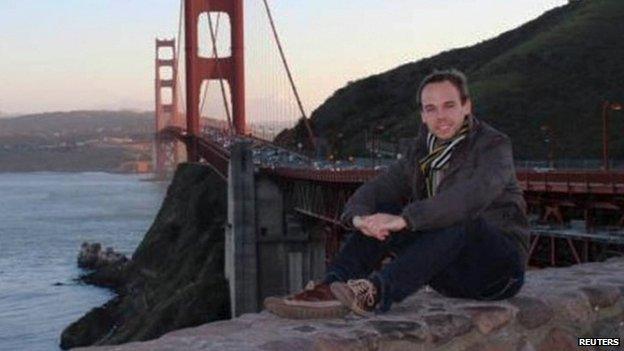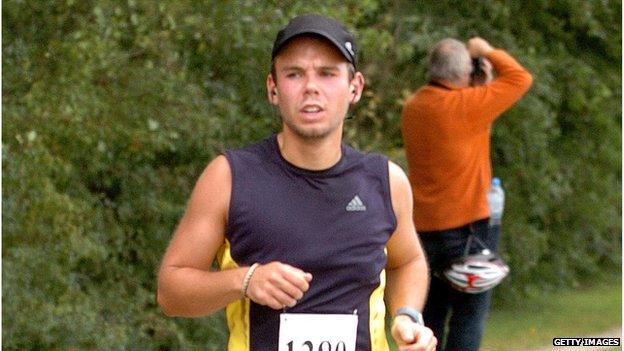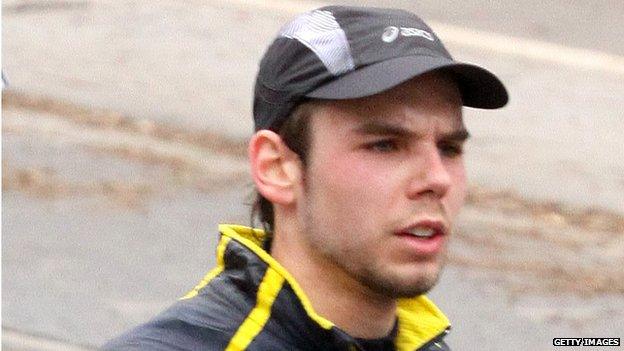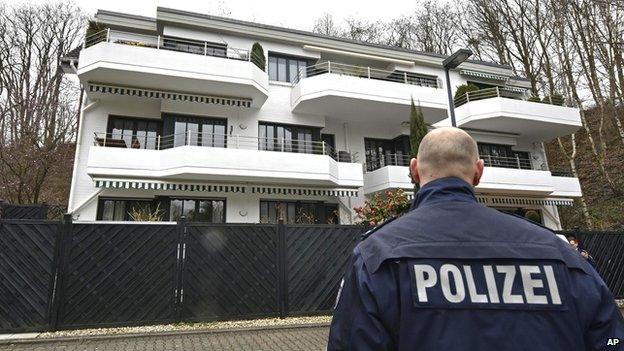Germanwings crash: Who was co-pilot Andreas Lubitz?
- Published

Andreas Lubitz was accepted as a Lufthansa trainee in 2008
Andreas Lubitz, the young co-pilot who deliberately crashed a Germanwings airliner into the French Alps on 24 March 2015, killing himself and 149 other people, started flying as a teenager.
He first took to the skies as a member of a gliding club in his hometown of Montabaur in west Germany before fulfilling his ambition of becoming a professional pilot.
Friends and neighbours described him as a "quiet" but "fun" character, who enjoyed his job.
A picture from his now defunct Facebook page shows him smiling happily in front of the Golden Gate Bridge in San Francisco.
In the aftermath of the disaster, investigators have established a very different side to his character.
Police found torn-up sick notes in his homes, including one covering the day of the crash.

In addition to having a passion for flying, Mr Lubitz was also reportedly a keen runner
Despite assertions from friends that he was in good spirits, the final report , externalon the crash by French investigators found he had suffered from a psychiatric condition and had been taking medication before the crash.
Fearing he was losing his vision, he had hidden the evidence from his employer.
The Bild newspaper also reported, external that he may have been going through a "personal life crisis" at the time of the crash.
Keen runner
Lsubitz lived at his parents' home in Montabaur, a town near Frankfurt of about 12,500 people. His father Guenther worked in banking and his mother was a church organist.
He was about 14 when he joined the LSC Westerwald glider club in Montabaur, where he learned to fly in a sleek white ASK-21 two-seater and went on to obtain his full licence, according to club chairman Klaus Radke.
He was also a keen runner, competing in several races.

The photo shows the young pilot taking part in a half-marathon in Frankfurt in 2010
In 2007, he graduated from high school and was accepted as a Lufthansa trainee the following year, enrolling at the company's training school in Bremen.
Lubitz had a break in training about six years ago, lasting several months, according to Lufthansa CEO Carsten Spohr.
Mr Spohr refused to disclose the reason for this gap but said his suitability had been reassessed and Lubitz had resumed his studies.
But the final report of the investigation into the crash finds the interruption was caused by medical problems.
He suffered a serious depressive episode during his treatment and went on to receive treatment for a year and a half. During that time, he considered suicide but was eventually declared healthy.
It was recommended by a doctor that he needed special regular medical inspection and his medical certificates were valid for only one year at a time. A relevant note was added to his aviation authority file as well as to his pilot's licence.

There is a strong police presence outside the co-pilot's flat in Duesseldorf
In 2013 he joined Lufthansa's low budget airline, Germanwings. He initially worked as a flight attendant before starting his role as co-pilot.
His duties would have included monitoring instruments, communicating with air traffic controllers and sharing control of the aircraft with the captain. He would have also been expected to steer the plane during the pilot's breaks, or if he or she became ill.
'Very happy'
Lufthansa said Lubitz had flown a total of 630 hours before the fatal crash.
He underwent a regular security check on 27 January and nothing untoward was found. Previous security checks in 2008 and 2010 also showed no issues.
"He was 100% fit to fly without any restrictions or conditions," Mr Spohr said. Yet the crash investigation found differently.
He had battled with vision problems and insomnia for several months, it said, caused by a psychiatric disorder rather than anything physical.
He was taking medication for both psychiatric issues and insomnia, and had been given doctor's notes excusing him from work. But he never showed them to the airline.
"On the day of the accident, the pilot was still suffering from a psychiatric disorder, which was possibly a psychotic depressive episode and was taking psychotropic medication," the report found.
"This made him unfit to fly."
But the report found he had hidden the evidence, and neither the airline nor his colleagues could have known about his circumstances.
Those who knew Lubitz have described him as an affable young man, who gave no indications he was harbouring any harmful intent.
Members of the flight club where Andreas Lubitz was a member have been talking about his personality
Klaus Radke told the Associated Press that he had seen him when he returned to the club to renew his glider licence in the autumn of 2014.
"He seemed very enthusiastic about his career," he said. "I can't remember anything where something wasn't right."
Peter Ruecker, a long-time member of club, also insisted Lubitz had seemed "very happy" during their last meeting.
"I'm just speechless," he said. "I don't have any explanation for this. Knowing Andreas, this is just inconceivable for me."
A German criminal investigation into the crash concluded in January that Lubitz bore sole responsibility for crashing the jet.
Guenther Lubitz, the killer's father, rejected the findings as "false", arguing that they were not thorough enough.
He and his wife placed a loving tribute to their son in a local newspaper to mark the first anniversary of the crash, angering families of the victims, German broadcaster Deutsche Welle reports, external.